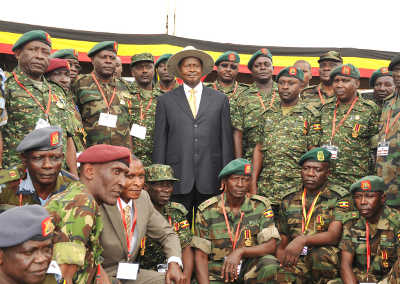Analysis
Can the army feed Uganda, when it can’t feed itself?

President Museveni says his real motive for putting soldiers into farming is to get them some income
At the risk of drawing the general public’s interest into debating national security matters – something that the president considers to be a taboo subject, Museveni has once again invited the public to assess the army’s performance in managing affairs of the state.
While in the beginning it seemed that the president’s decision to deploy soldiers in civil aviation, police was informed by strategic concerns, subsequent deployments into the health, works, local government have caused concern as to the presence of a much grandeur plan to subdue the will of the people in favour of the whims of the few, argue analysts.
Experts now argue that the involvement of soldiers in NAADS to supervise or perhaps take the place of trained agricultural extension workers, is a continuation of the militarization of Uganda’s affairs.
James Nkuubi, a lawyer with Human Rights Network Uganda, argues that the deployment of soldiers can be traced to the days of the late Noble Mayombo when he was deployed as the permanent secretary of the ministry of defence. Since then, President Museveni has deployed officers such as Dr. Atwine into the ministry of health.
Can soldiers teach farming?
Before the veterans take over NAADS, it may be worthy to assess the performance soldiers in the sector.
Uganda People’s Defence Forces owns large chunks of land across the country. Barracks such as in Masidi, Mubende, Kimaka, Kasijjagirwa in Masaka, Kakiri in Wakiso sit on swaths of fertile land that has nothing to show except bushes. As a consequence, despite the great land endowment, UPDF procures almost 100 percent of its food requirements.
The previous leadership of the UPDF under the command of Gen. Aronda Nyakairima appeared to have a plan to equip soldiers with some farming skills. In an interview with The Sunrise in February 2012, Gen. Aronda outlined a plan to improve food security of the soldiers.
Aronda said then: “As an institution, we are planning to put aside some land for commercial farming of fruits, maize and animal husbandry, which will eventually enhance the national budget.”
Instead of implementing Aronda’s plan, the government this year allocated nearly 13 square kms of land in Nakasongola that was previously owned by the UPDF, to Turkish investors for the establishment of an abattoir.
Paddy Ankunda, the UPDF spokesperson confirmed to The Sunrise that through the leadership of Brig. Jacob Musajjaawaza, the Director of Production in UPDF, the force is still trying to promote Aronda’s vision of growing its own food.
The Uganda Prisons Service, is the only security institution in the country that has demonstrated capacity to to contribute towards its food needs.
As Frank Baine, the spokesperson of the Uganda Prisons Service told The Sunrise, Prisons is able to feed itself four months out of twelve. And its not just the use of prisoners that gives the custodial chiefs this edge, but more that use of mechanised farming, dedication and pragmatic leadership.
On the contrary, in many Barracks in Uganda, soldiers waste productive time playing cards, rather than exploiting abundant land and putting their farming skills to test.
NEC tractor project fails
The army’s involvement with civilian agriculture has registered a trail of glitches already. A few years ago, the government injected billions of shillings into the National Enterprise Corporation (NEC) to start the Tractor Hire Scheme at sub-counties.
The project was meant to purchase and operate a tractor hire scheme at every sub-county in the country. The project, run by soldiers, was meant to spur the commercialisation of agriculture through increased mechanisation.
The persistent low level of mechanisation in the country suggests that the programme is under-achieving. So as the president goes around selling the veterans programme, he may need to train soldiers in proper agricultural science as well as people management.
Comments


















